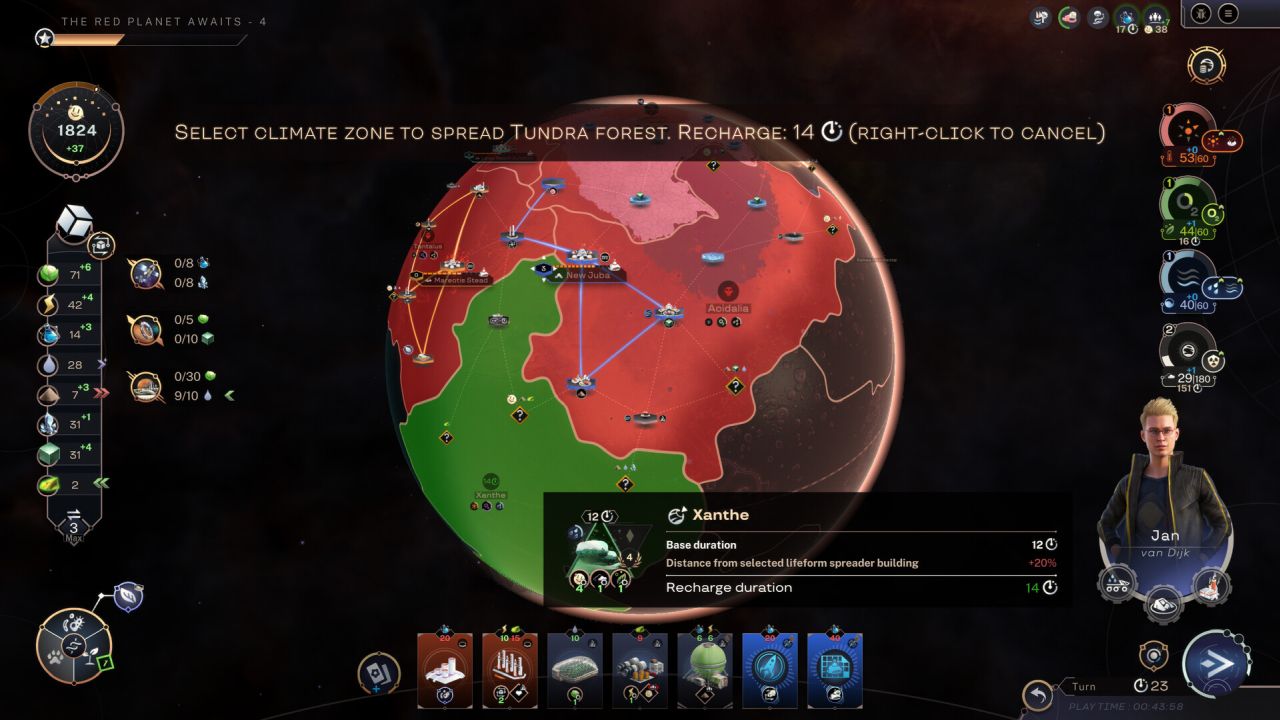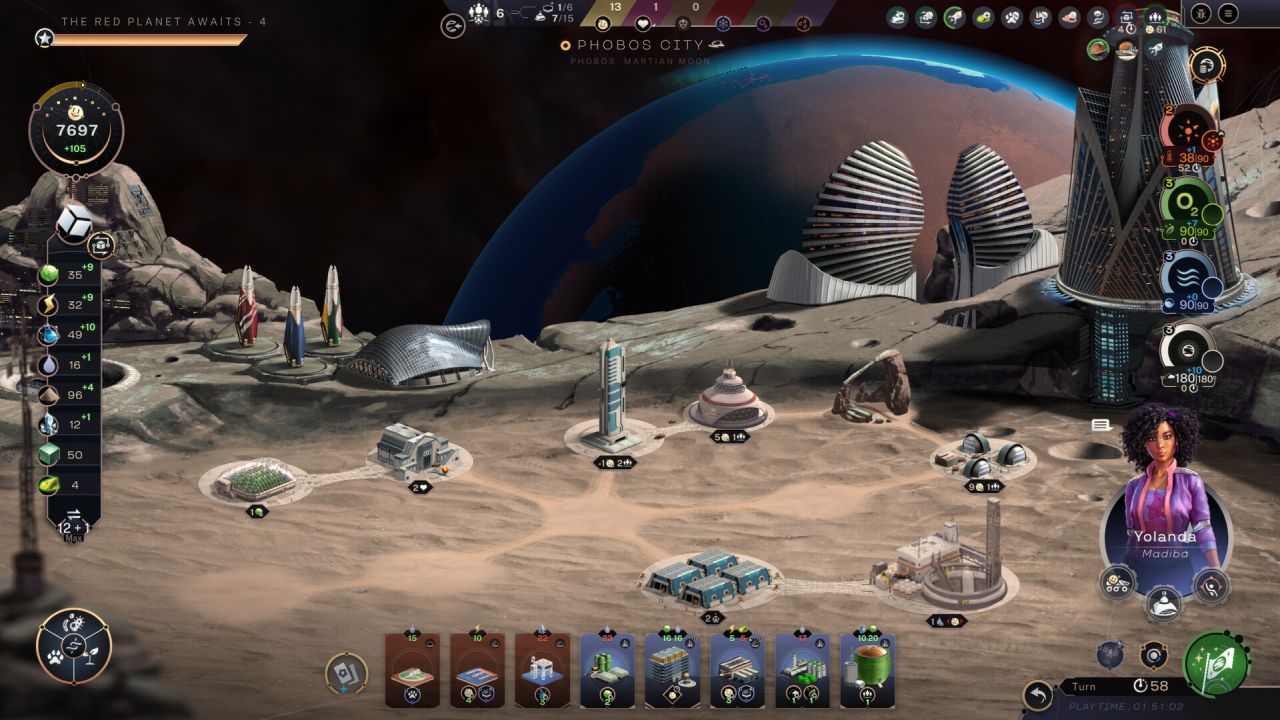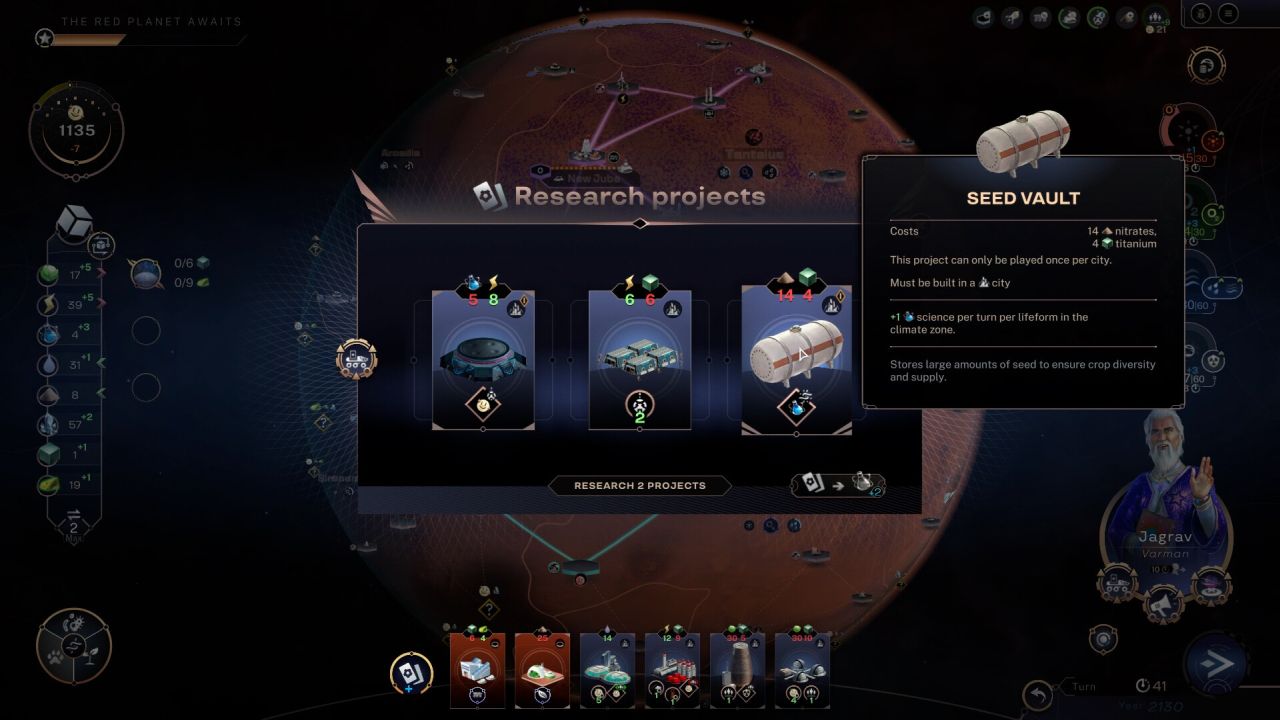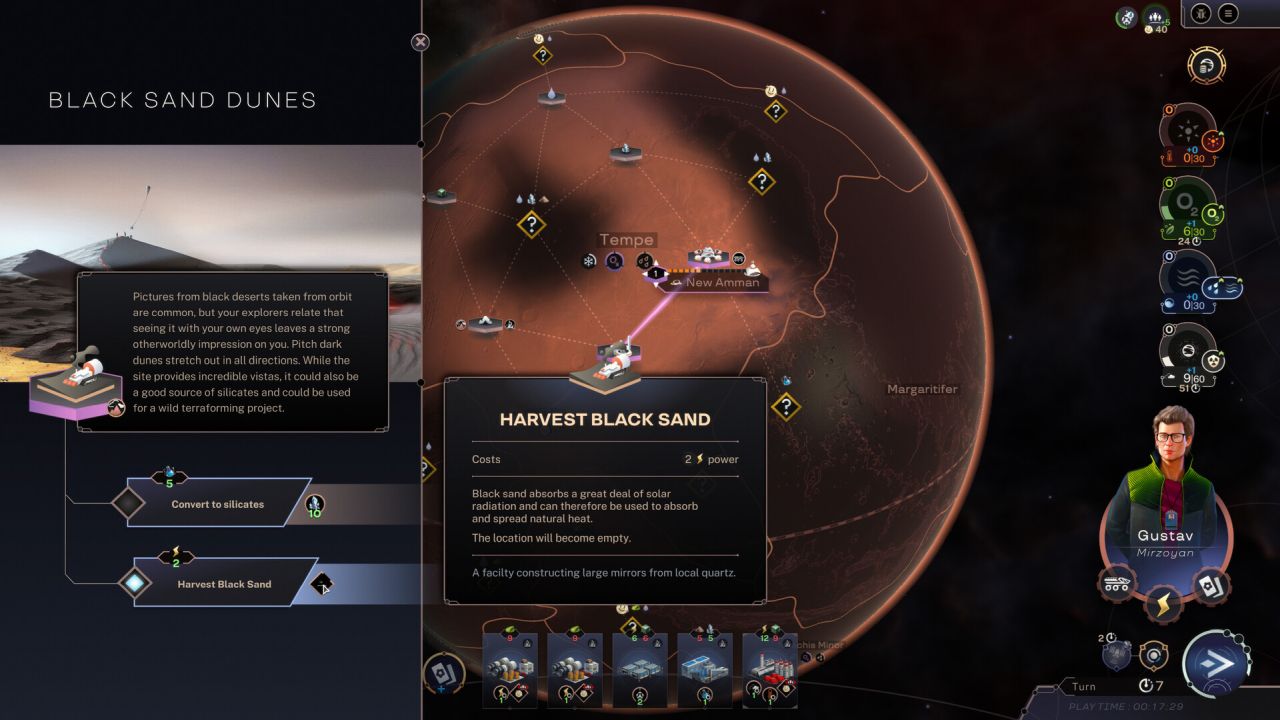Terraformers Review
An interesting genre mix at a good price point
Management and strategy games are probably not the first choice for many smaller developers. The inherent complexity and daunting comparisons to the leaders of the genre mean it is not an easy undertaking. However, some teams still try – with the latest example being Terraformers from Asteroid Lab. This turn-based space colony management title features a variety of mechanics, many of them with a unique perspective, and while far from everything works, the low asking price and an original gameplay mix should entice some players.

Terraformers sees players assume the role of a leader of a newly established colony on Mars. Your goal is not only to colonize the planet by expanding into new cities, gathering resources, and meeting the needs of the locals, but also by spreading life to this new world by means of bacterial generation, atmosphere changes, and eventually creating animal habitats. There's a lot of things that vie for your attention, and while the turn-based nature of the game help it from becoming overwhelming, the whole experience can still feel rather unwieldy. When you've got helpful – but massive – tooltips popping up on various menus, it can be a burden to try and deal with so many concepts at once.
But it all starts at the basics – managing your first colony. Players select one of a few randomly generated Leaders, about every 10 turns, who offer two skills as well as a passive bonus. Depending on the leader, the skills can be useful – such as importing pollution from Earth to raise the temperature on Mars, or getting free resources, to less versatile, such as speeding up the spread of bacteria when you may not have any viable regions to do it in. Other than the character screens, you don't observe these leaders in the game world – which is a 3D rendering of the Red Planet, divided into sections and randomly generated plots of land that can be explored. You can rotate the view freely, but exploring can only be done sector-by-sector, as the planet gradually reveals itself in whatever direction you wish to venture. Exploring a slot of land collects whatever resources may be found there, which is helpful given that you need them for construction. You can only explore once per turn, then will switch your attention to other tasks at hand.
At the start of each turn, you are dealt a few random building blueprints, from which you can select the ones you want to keep. These then become structures that you can place in the outpost, given you have enough resources. You can only hold a certain amount of building blueprints at a time, and once you reach a limit, you have to sell previous cards for science currency. This randomly generated building mechanic gives the game a roguelike or a card-based game vibe, as getting dealt some poor options can definitely stifle progress and create issues. It won't be to everyone's liking, especially for fans of more traditional city builders, but it's certainly an interesting concept.

Your colonies have their own 3D screen, where you can place buildings on pre-determined slots. These slots are connected to each other, and building placement often has implications – putting a refinery next to housing will reduce happiness levels. Some of the slots themselves can also have special values that can increase resource outputs and other factors.The spaces within each city are fairly limited, so you must always work to explore and expand. New cities can be founded on sectors that the game finds suitable, and the process begins anew as you fill the area with buildings to increase production, happiness, and also perhaps affect the planet. Once a colony grows enough in population, you can takeover nearby sectors on the planet map and mine their resources, or construct special buildings that cannot exist within the colony.
All of this construction has one primary goal – to keep your colonists happy. The Support Meter represents the satisfaction of your fellow Martians, and it is affected by a variety of factors – from your building selection (putting down an entertainment center), to its placement (not putting food production next to factories), and random factors, such as disasters that may strike like floods or storms. Even if you find the right balance, like managing the happiness in a Civ game, it's not the final solution – the Support Meter will grow together with your population, so its total number requirement will get higher and higher over the course of the game. At times, this means you are fighting an endless battle, as it's difficult to make meaningful progress against a constantly moving target; combine that with the building blueprint card system, and some campaigns are simply not meant to survive.
Keeping your colonization going is just one part of the puzzle, though. The other main goal is an entire system of mechanics meant to make the planet habitable. This includes increasing its temperature, creating an atmosphere with breathable air, bodies of water, and more by placing special buildings and performing certain actions. You will have to make choices about what type of bacteria to bring from Earth and what part of the planet to deploy it on. You can build bacteria-spreader buildings, plant forests, and eventually introduce animals and plants. All of this takes many turns, and while often quite convoluted to execute, it's at least neat to see it happen overtime, as the 3D planet begins to shift in color and terrain.

To get resources needed for all of this, you can trade with Earth through a fairly basic but intuitive system. The resources are treated with 1 to 1 value, which is a bit odd, but it's great that you can send whatever you don't need away, and get something much more rare in return. You are limited to one trade per turn, and though that can be increased, it's not an easy ticket to victory. There are about 8 resources in total to worry about, which includes food and water. It is possible to be self-sufficient with the basics, and just trade them away. You can also tackle special projects such as building Mars support satellites, by sending resources off-planet, which grants you rewards when completed. And yet still, there are more mechanics to consider, such as the prestige system, the research resources, and so on. Terraformers is a game of grand ambitions, and yet its many mechanics often feel disorienting, and the functional but very busy UI with multitude of icons and tooltips, don’t make it any more user-friendly.
Elsewhere, the game looks decent for its price range. The 3D render of Mars doesn’t have a lot of detail, but as mentioned it's neat to see the planet change overtime. In cities, the structures are basic and have a hint of a mobile game design, but it doesn’t distract. The minimalistic animations and soundtrack are serviceable, if not much more. The menus are slick and clean, but again not always user friendly and some of the elements can be too small, such as in the trading system.
Despite the issues, the game offers great value at its low $20 asking price. Not only do you get a ton of mechanics to delve into, should you choose to take the plunge, but there's lots of campaign victory conditions to aim for, with ever-increasing difficulty. There are no enemy factions, so you are mostly battling against your luck with the building card system, and random events that can destroy your structures and cause a snowball effect on the unhappiness of the populace. There's even a custom game generator, weekly challenges, different event modifiers and other options. At least in its flexibility, the title definitely impresses and can be favorably compared to the leaders of the 4X genre. And as you play and increase your profile level, you unlock more leaders, buildings and biodiversity to be used in your future campaigns.

Terraformers is an interesting turn based space colony game. Its mix of 4X, roguelike, and card-game elements is certainly unique, if nothing else. And while these elements aren't always well executed, explained, nor do they always gel together, the great price point helps offset these shortcomings. If you are a fan of any of these three genres and are looking for something starkly different, Terraformers may be well worth checking out – just be warned that the experiment may not be as enjoyable for you as it is for other players.
 Comments
Comments











